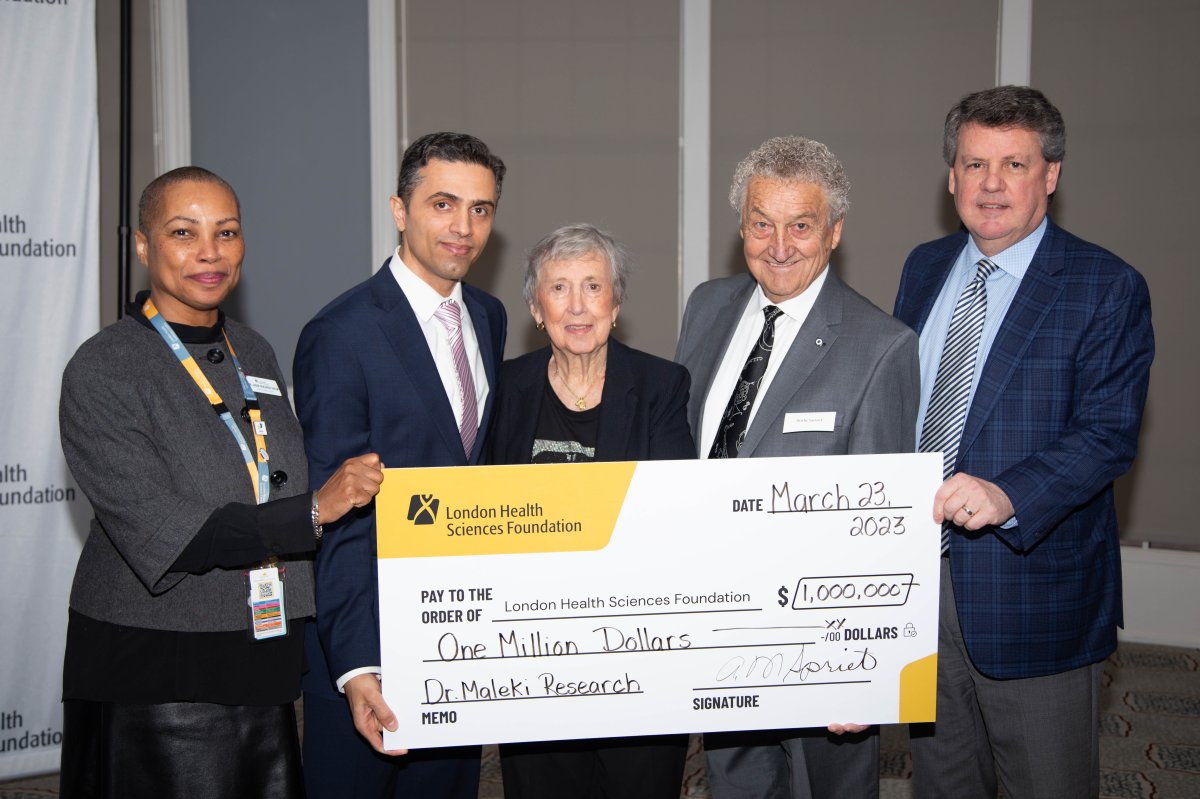A $1-million donation by London, Ont.’s, Andy and Helen Spriet will help expand an unconventional form of cancer treatment, the London Health Sciences Foundation announced Thursday.

The seven-digit donation will be used to establish an immuno-oncology research program at London Health Sciences Centre’s regional cancer program.
“It’s so inspirational for us at the foundation and the hospital, as well as in the community,” said John MacFarlane, president and CEO of the health sciences foundation.
“We know this donation is going to inspire others to do similar things.”
The innovative treatment combines fecal microbiota transplantation (FMT) with immunotherapy, a type of cancer treatment that helps the immune system fight cancer.
Dr. Saman Maleki, a scientist with the heath sciences centre, is the lead researcher for immuno-oncology in London. Maleki says the donation, which is being supported by Ontario Institute for Cancer Research, will help him and his team take the next steps in finding treatments for cancer patients.
“It’s transformative in the sense it can allow us to do more of these unconventional research ideas,” Maleki said, adding the donation helps speed up the process by avoiding the wait for grant money.
“It hasn’t been easy to build this vision and studies around here, but it’s remarkable to see the local community really take it upon themselves to come and support this.”
- Invasive strep: ‘Don’t wait’ to seek care, N.S. woman warns on long road to recovery
- Canadian man dies during Texas Ironman event. His widow wants answers as to why
- ‘Super lice’ are becoming more resistant to chemical shampoos. What to use instead
- ‘Sciatica was gone’: hospital performs robot-assisted spinal surgery in Canadian first
FMT treatment involves collecting and processing stool from a healthy donor to find good bacteria. The good bacteria are then transplanted into a patient suffering from a chronic illness to boost their healthy bacteria and restore a balance, as antibiotics can sometimes kill off healthy bacteria in the gut.
While FMT has traditionally only been used to treat a disease called Clostridium difficile, Maleki said the idea of using it in conjunction with immunotherapy to treat other illnesses, such as cancer, came to him in 2016.
After working for a few years on the methodology, Maleki began the first-ever human trials of FMT with immunotherapy in 2019 with patients suffering from advanced melanoma. As immunotherapy uses the immune system to find and destroy cancer cells, Maleki says FMT is a logical extension of the treatment as a person’s gut bacteria is heavily connected with their immune system.
“We are aiming to improve patient outcomes by boosting their immune response to the treatments administered,” Maleki said.
According to the health sciences foundation, the patients taking part in the initial trials experienced less treatment toxicity and improved treatment response. While traditional FMT has involved transplanting fecal matter via a colonoscopy, advances have enabled it to be done by simply swallowing capsules like a pill.
The Spriets say their donation was inspired partly by the many people close to them have been afflicted with — and even died from — cancer.
“My sister died of cancer, and she didn’t make 50. Now her daughter has breast cancer,” said Helen Spriet, adding she also has a cousin who lost his wife and two sons to cancer.
“It’s very much in the family and something I’m very much interested in.”
The Spriets say they are amazed at what Maleki and his team are creating at the London Health Sciences Centre, adding that the potential to make this a global treatment is what really intrigued them.
Maleki says the contribution by the Spirets is extra special since they are from London.
“Andy and Helen … are Londoners and they saw the potential for this, and they want to grow this science here in London,” Maleki said. “I’m so grateful they saw the potential and want to be part of it.”
With the donation, Maleki says he will be able to expand the research into other forms of cancers, such as kidney and pancreatic cancer.
“Pancreatic cancer is a horrible disease. In the last 30 or 40 years, there really hasn’t been a lot of advancements in,” he said.
According to John Hopkins Medicine, the five-year survival rate after diagnosis is only five to 10 per cent, depending on the type of tumour.
“It is important to me to see if we can tackle that nasty cancer this way,” Maleki said.








Comments